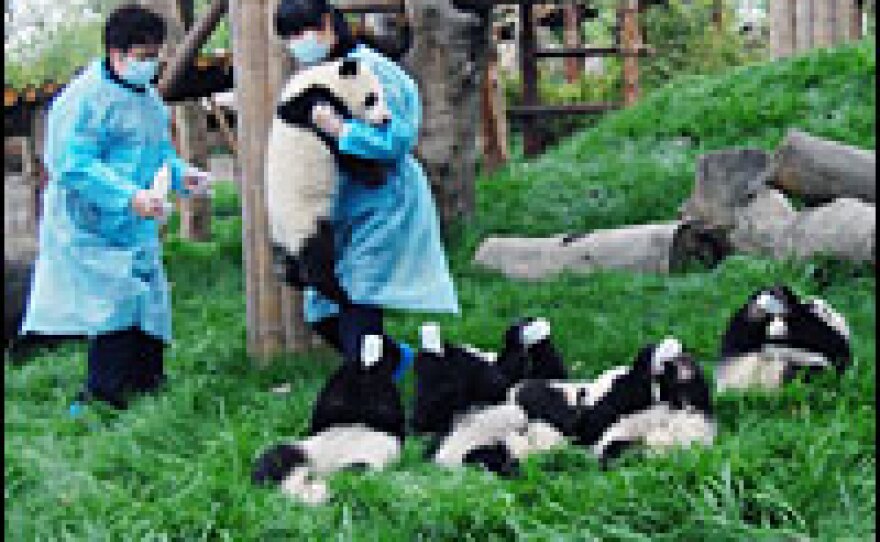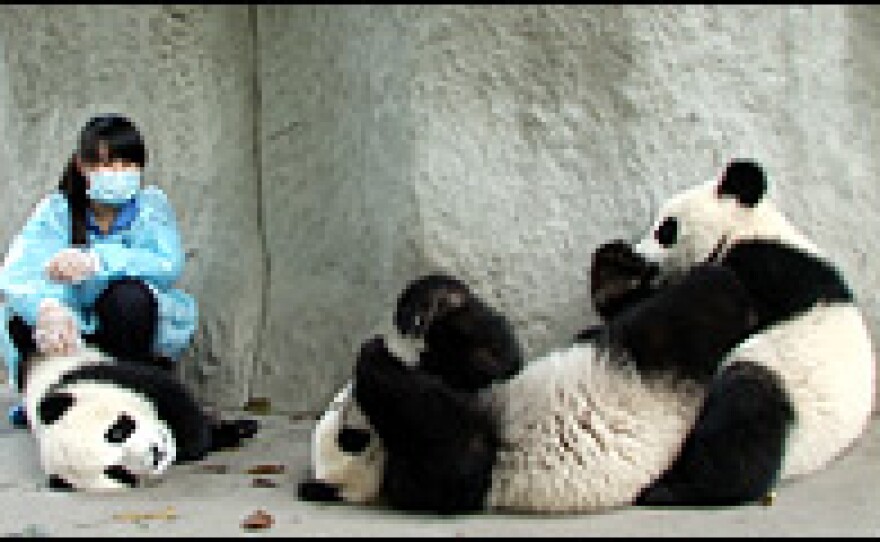



Found only in China, the giant panda is threatened by extinction, and researchers in southwestern China have devoted themselves to saving the species. The May 12 earthquake in Sichuan province has only exacerbated the challenges facing the already fragile population.
It's estimated there are fewer than 1,600 pandas left in the wild.
There are 239 more in captivity — including 48 in Chengdu, the capital of Sichuan — at the Chengdu Research Base of Giant Panda Breeding.
Pandemonium at Panda Base
When the earthquake hit, the base's director, Zhang Zhihe, first made sure everyone on his staff was okay. Then he rushed to the panda nursery to find out if the pandas were okay, he says. The keepers told him that the baby pandas panicked and tried to climb up the iron bars of their indoor enclosure.
The adult pandas rushed outside and got as high off the ground as they could climb. They were making sounds indicating they were terrified, he says.
The pandas at the Chengdu base seem fine now.
The story is very different at another panda center in the mountains at Wolong, near the quake's epicenter. That facility was badly damaged: Five staffers were killed, and two pandas are missing.
The Chengdu panda base has taken in eight pandas from Wolong so far; Zhang expects he will be receiving more from Wolong and, possibly, injured pandas rescued from the wild in the earthquake zone. Search teams will be sent out to look for them, high in the mountains.
The Chengdu base started 20 years ago with six sick and starving pandas rescued from the wild.
During a visit in April, eight panda cubs clambered over wooden climbing structures as their keepers called to them during a mid-afternoon feeding.
The black and white furballs emitted tiny squeaks, rushed toward the keepers and used their front paws to grab baby bottles filled with formula. They lay back on the grass and gulped the formula down.
From Privation to Pandas
Director Zhang has worked very hard to build the Chengdu base into a world-class institution. And he has a remarkable story of his own.
The son of peasant farmers, Zhang grew up in a tiny mountain village in Sichuan. His father died when he was 3, and his life was very hard, he says, food and clothing were scarce. In 1981, he was the only person from his district of 200,000 to attend college.
Zhang, now 42, went on to study veterinary medicine and has been director of the panda base for six years.
"Pandas are very beautiful, very rare. The more time you spend with them, the more you grow to like them," Zhang says affectionately.
Battle for the Right Diet
A few years ago, Zhang did something revolutionary at the panda base. At the time, the staff was feeding the pandas a diet heavy on grains and dairy, convinced that a human diet was best.
But Zhang observed that the pandas weren't healthy — they were chronically ill and exhibited stunted development — and decided to change their diet and feed them mainly bamboo.
It sounds simple, but he was bucking a rigid system — and the decision took a toll.
Zhang says it was a very difficult time for him.
"I couldn't sleep for many, many nights. It was like having a stone on my heart, that I couldn't get rid of," he says.
Kati Loeffler, the panda base's director of animal health, is one of two Western scientists Zhang hired — the only foreigners ever to be hired by the base.
"Zhang Zhihe had to fight with his veterinary staff, with his husbandry staff — with absolutely everybody. He had to take personal responsibility," she says.
The stress of deciding to change the pandas' diet was so severe that Zhang became physically ill and even lost his voice for months, Loeffler says.
"But he did it. And the change in the health of these animals over the last two years is even greater than I would have expected it to be," she says.
Now, Zhang is worried about the bamboo supply for these animals, because the panda base harvested much of its bamboo from an area near the earthquake's epicenter.
But the director says he knows the panda reserve at Wolong is far worse off. So even though he worries about his own supply of bamboo, he decided to send a large truckful to Wolong.
Push to Release Captive Pandas into the Wild
When the immediate crisis settles down, another fight looms over reintroducing giant pandas into the wild. The pandas at the breeding center have all been raised in captivity: They've been handled intensively by humans since birth and have no survival skills.
Loeffler says if you want to introduce a new generation of pandas into the wild — and do it right — it would take five to 10 years of planning.
But she says Zhang is facing pressure from the Chinese government to move pandas into the wild — and fast. It's perceived by the Chinese authorities as the next, high-profile achievement.
"That's the next sexy thing to do," Loeffler says. "But I'm very encouraged by Zhang Zhihe's support of really trying to do it well — and really taking the time to do the necessary planning and research that really has to go into it — rather than just flinging a panda out there and seeing what happens kind of thing."
And they've seen what can happen: Two years ago, the Wolong panda reserve released a panda that had been bred and raised in captivity. Xiang Xiang was found dead within a year. Scientists believe he was killed by rival males.
Revamping Breeding Practices
There is another area in which Zhang may face an uphill battle — the traditional push to get the pandas to breed as much as possible.
The panda base isn't called a breeding center for nothing: Its goal is to boost the panda population.
In the wild, the baby pandas that are drinking from bottles would still be nursing. But at the base, they are weaned a year or two early, so the mothers can go into estrus — being "in heat" — and, perhaps, get pregnant again.
A female panda might be anesthetized three to six times in one day for artificial insemination. Veterinarian Loeffler says in the wild, a female panda will raise a cub on average about once every four years.
"In captivity, the goal is to get at least one cub, ideally twins, out of that female every single year, which of course is physiologically completely abnormal," Loeffler says.
She likens the panda base to a "panda factory."
But Zhang, the panda base director, disagrees with that label.
"Maybe for the first phase, it can be called a panda factory. But this factory [is] a factory in which pandas with good quality, with good genetic diversity [will] be produced," he says.
Zhang walks a tightrope, balancing the interests of the pandas against the need to increase the population so it can sustain itself. He hopes that soon the staff at the base can let panda moms stay with their cubs longer. It's better for the babies, he says.
Quake Poses New Challenges
Right now, though, he must deal with a slew of new problems caused by the earthquake.
One major issue is that the quake has "totally destroyed" tourism, Zhang says. That's bad news for the panda base, which relies heavily on money from ticket sales.
Zhang says that this time last year, the base had as many as 5,000 visitors a day. Now, it receives only about 20 daily visitors.
Although the repercussions of the disaster are scary, Zhang remains focused on the future. "Worry cannot solve problems. We need to find solutions," he says.
Although the quiet is good for the pandas, Zhang says, with a rueful grin, it's not good at all for the future of the Chengdu Research Base of Giant Panda Breeding.
Copyright 2022 NPR. To see more, visit https://www.npr.org. 9(MDAzMjM2NDYzMDEyMzc1Njk5NjAxNzY3OQ001))







